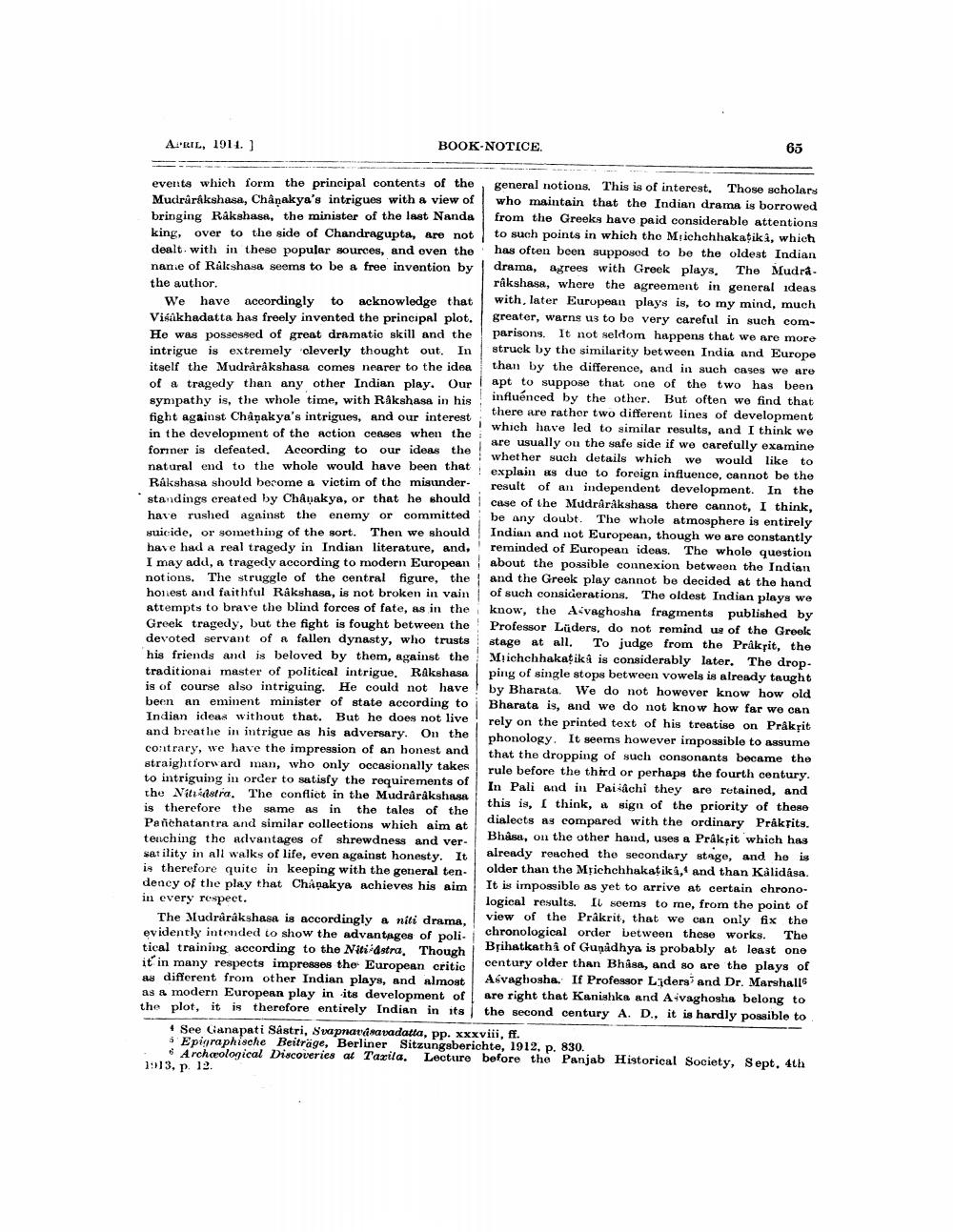________________
A RTL, 1911. ]
BOOK-NOTICE.
65
events which form the principal contents of the general notions. This is of interest. Those scholars Mudrárakshasa, Châņakya's intrigues with a view of who maintain that the Indian drama is borrowed bringing Rakshasa, the minister of the last Nanda from the Greeks have paid considerable attentions king, over to the side of Chandragupta, are not to such points in which the Michchhakatiki, which dealt with in these popular sources, and even the has often been supposed to be the oldest Indian nanie of Rakshasa seems to be a free invention bydrama, agrees with Greek plays, The Mudra. the author.
rakshasa, where the agreement in general ideas We have accordingly to acknowledge that with, later European plays is, to my mind, much Visakhadatta has freely invented the principal plot. greater, warns us to be very careful in such comHe was possessed of great dramatic skill and the parisons. It not seldom happens that we are more intrigue is extremely cleverly thought out. In struck by the similarity between India and Europe itself the Mudråråkshasa comes nearer to the idea
nes nearer to the idea than by the difference, and in such cases we are of a tragedy than any other Indian play. Our apt to suppose that one of the two has been sympathy is, the whole time, with Rakshasa in his
! influenced by the other. But often wo find that
there are rather two different lines of development fight against Chanakya's intrigues, and our interest
which have led to similar results, and I think we in the development of the action ceases when the
are usually on the safe side if we carefully examine forner is defeated. According to our ideas the
whether such details which we would like to natural end to the whole would have been that explains due to foreign influence, cannot be the Rakshasa should become a victim of the misunder.
result of an independent development. In the standings created by Chanakya, or that he should case of the Mudråråkshasa there cannot, I think, have rushed against the enemy or committed be any doubt. The whole atmosphere is entirely suicide, or something of the sort. Then we should Indian and not European, though we are constantly have had a real tragedy in Indian literature, and, reminded of European ideas. The whole question I may add, a tragedy according to modern European about the possible connexion between the Indian notions. The struggle of the central figure, the and the Greek play cannot be decided at the hand holiest and faithful Rakshasa, is not broken in vain of such considerations. The oldest Indian plays we attempts to brave the blind forces of fate, as in the know, the A vaghosha fragments published by Greek tragedy, but the fight is fought between the Professor Lüders, do not remind us of the Greek devoted servant of a fallen dynasty, who trusts stage at all. To judge from the Prakpit, the his friends and is beloved by them, against the Michehhakatiki is considerably later. The droptraditionai master of political intrigue. Rakshasa ping of single stops between vowels is already taught is of course also intriguing. He could not have ! by Bharata. We do not however know how old been an eminent minister of state according to Bharata is, and we do not know how far we can Indian ideas without that. But he does not live rely on the printed text of his treatise on Pråkpit and breathe in intrigue as his adversary. On the
phonology. It seems however impossible to assume contrary, we have the impression of an honest and
that the dropping of such consonants became the straightforward man, who only occasionally takes
rule before the third or perhaps the fourth century. to intriguing in order to satisfy the requirements of
In Pali and in Paisachi they are retained, and the Netstra. The conflict in the Mudrâråkshasa
this is, I think, a sign of the priority of these is therefore the same as in the tales of the Panchatantra and similar collections which aim at
dialects as compared with the ordinary Prakrits. teaching the advantages of shrewdness and ver
Bhasu, on the other hand, uses a Prakrit which has satility in all walks of life, even against honesty. It
already reached the secondary stage, and he is is therefore quite in keeping with the general ten. older than the Msichchhakatiki, and than Kalidasa. dency of the play that Chanakya achieves his aim It is impossible as yet to arrive at certain chronoin every respect.
logical results. It seems to me, from the point of The Mudrårákshasa is accordingly niti drama,
view of the Prakrit, that we can only fix the evidently intended to show the advantages of poli.
chronological order between these works. The tical training according to the Nitidstra. Though
Brihatkathi of Guņådhya is probably at least one it in many respects impresses the European critic
century older than Bhasa, and so are the plays of as different from other Indian plays, and almost Asvaghosha. If Professor Liders and Dr. Marshall as & modern European play in its development of are right that Kanishka and Avaghosha belong to the plot, it is therefore entirely Indian in its the second century A. D., it is hardly possible to
+ See Canapati Sastri, Suripnadnaradatta, pp. xxxviii. ff. 5 Epigraphische Beiträge, Berliner Sitzungsberichte, 1912, p. 830.
& Archeological Discoveries at Taxila. Lecture before the Panjab Historical Society, Sept. 4th 1:13, p. 12.




